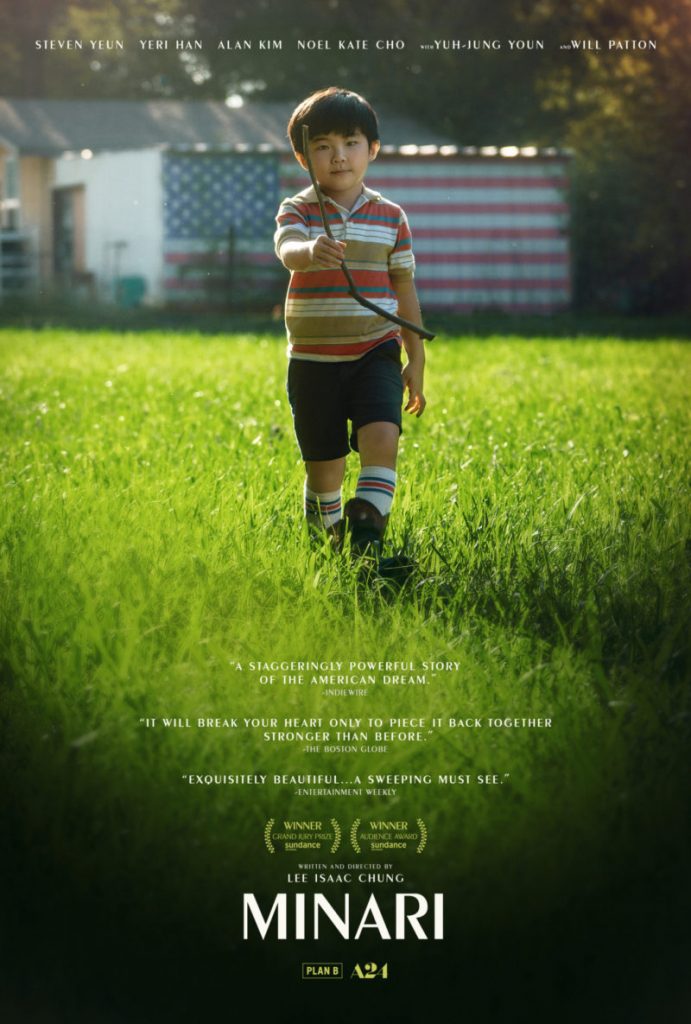“Minari” Movie Analysis: A Korean Immigrant Story about the American Dream

Lee Isaac Chung’s movie Minari tells the story of a South Korean immigrant family and their American Dream.
Warning: This analysis may contain some spoilers for the movie.
Since May is dedicated as the Asian American and Pacific Islander (AAPI) Heritage Month, I thought it would be fitting to do a deep dive into the movie Minari. With the rise in anti-Asian discrimination, it is more important than ever to celebrate and discuss our cultures and immigrant backgrounds.
Directed by Lee Isaac Chung, Minari is a semi-autobiographical movie about Chung’s childhood. It tells the story of a South Korean immigrant Yi family that moves to rural Arkansas from California in the 1980s.
The Struggles of Immigrant Families
The movie opens with the Yi family moving to their new home in Arkansas: it’s a mobile home on acres of sprawling land. It’s the middle of nowhere, with the nearest hospital being an hour’s drive away.
While the father Jacob dreams of a new start made through farming, the mother Monica views their new home environment with disgruntlement. And fairly so, since their son David has a heart condition. Unsurprisingly, Jacob and Monica have their first argument within the first twenty minutes, their voices rising as the two children—Anne and David—attempt to break their argument with paper airplanes carrying their pleas.
As someone who comes from an immigrant family, I found this scene very familiar. Moving to the U.S. symbolizes a new start for incoming immigrants. It’s the American Dream: the U.S. is the land of opportunities for everyone who works hard, right? But despite their move from California to Arkansas, the Yi family’s hopes for the future are undermined by their financial struggles. Trying to raise a family while worrying over finances and bills will always be tough, especially for immigrants doing their best to make ends meet.
But the Asian American experience is more than just financial struggles as Minari shows Anne and David’s brush with racism when the Yi family attends Sunday church. While Anne meets a white girl who babbles gibberish in an attempt to speak Korean, David meets a white boy who greets him with a question: “Why is your face so flat?” Although these children’s actions are done out of ignorance, they symbolize how Anne, David, and the rest of the Yi family are outsiders with their looks, language, and culture.
We see that manifesting in David as he tries to fit in with the other children. His relationship with his grandmother Soon-ja starts off rocky because she is the physical representation of his heritage. “Grandma smells like Korea!” David complains to Anne and compares Soon-ja to white grandmas who seem nice and bake amazing cookies. It’s the process of othering in which David attempts to assimilate by distancing himself from his cultural identity. The Asian American Dream is not quite easy, as Minari shows us.
An American Dream Told Through Minari
While many people dream about becoming the living example of a rags-to-riches success story—the most idealized American Dream, there are just as many people who simply want to make enough money to live well. One poignant quote comes from Jacob and Monica’s conversation as they wait for the verdict on David’s heart condition in the hospital. “We’d go to America and save each other,” Jacob says, recalling their promises to one another.

It is a simple American Dream shared by many immigrants. Simple yet persevering.
In fact, the movie is named after an edible plant commonly found in East Asia. In an interview with The Wrap at the 2020 Sundance Film Festival, Director Chung and the cast of Minari discuss the plant, which leads to an interesting exchange as Chung accidentally calls the vegetable a “weed.” Chung notes, “The interesting thing about it is that it’s a plant that will grow very strongly in its second season after it has died and come back. So there’s an element of that in the film, so it grows very expansively without doing much to it. It’s a poetic plant in a way for me.”
While Jacob carefully cultivates his farm through lots of labor, the grandmother Soon-ja plants her minari seeds by the creek in an almost lackadaisical fashion, teaching Anne and David how the vegetable is adaptable and versatile. Not only is it good in kimchi and stew, but it has medicinal uses, too. It can grow in almost any environment.
At the end of the movie, disaster strikes the Yi family when burning trash goes awry. A fire burns down Jacob’s barn filled with fresh produce ready to be sold. The family watches their efforts go up in flames, tears streaking down their ashen faces. It’s a heartbreaking moment to watch as we see their American Dream falling apart in front of our eyes.
But the minari survives. It thrives as David brings his father to the creek. The father-son duo’s harvesting highlights hope for the Yi family. Minari persists in harsh conditions with little care; likewise, the Yi family can survive and make a living in Arkansas.
The movie’s hopeful ending leaves me with so many feelings. Minari is a beautiful, heart-moving narrative about the Korean American story. At the same time, it shares a universal message about immigrant families and their struggles to succeed.
The Asian American Dream: Still Foreign
Then the Golden Globes happened in which Minari won as the best foreign language film, excluded from the best motion picture category because over 50% of the dialogue was not in English. It’s a tragic moment when Minari, a story about a family pursuing the American Dream, gets relegated to the foreign language film category just like that. As if language and culture can define people as non-American.
The Golden Globes’ perspective on Minari is a bitter reminder that Asian Americans are still viewed as foreigners. “In a climate of heightened anti-Asian violence, labeling an Asian American film like Minari ‘foreign’ feels even more offensive,” says Nancy Wang Yuen from NBC News.
And I agree: it belittles the Asian American experience and alienates the Asian American community.
Overall, Minari‘s portrayal of the Asian American Dream is a nuanced narrative about immigrant families. The movie’s designation as a foreign film is even more of a reason to celebrate AAPI Heritage Month. (See: International Women’s Day 2021: Recognizing Asian and Asian-American Women in Pop Culture #IWD2021) You can learn more about anti-Asian discrimination on Stop AAPI Hate.
What did you think about Minari?
Author: Angel Lin
Angel Lin is a recent graduate with a BA in Comparative Literature and minor in Japanese from the University of California, Santa Barbara. In her free time, she enjoys reading web novels, watching films, and doing creative writing.
Help support independent journalism. Subscribe to our Patreon.
Copyright © The Geekiary
Do not copy our content in whole to other websites. If you are reading this anywhere besides TheGeekiary.com, it has been stolen.Read our



